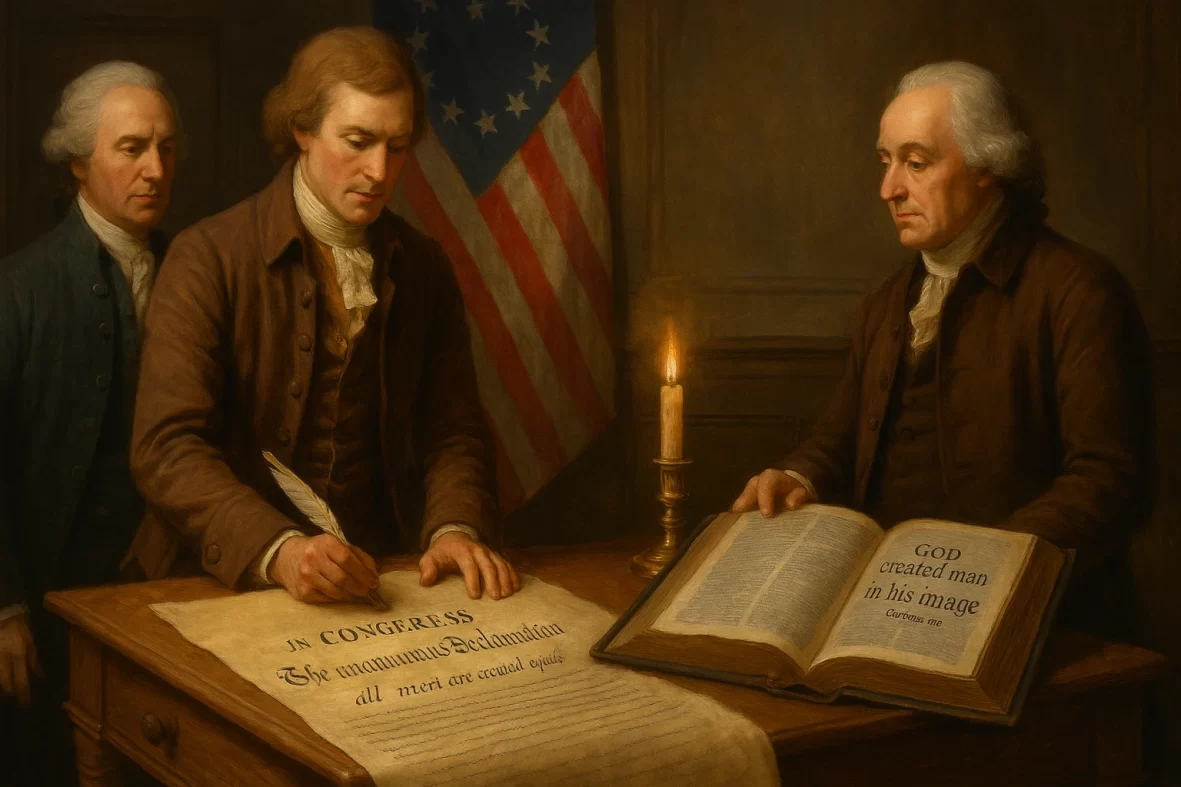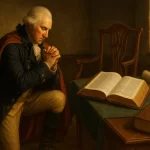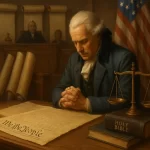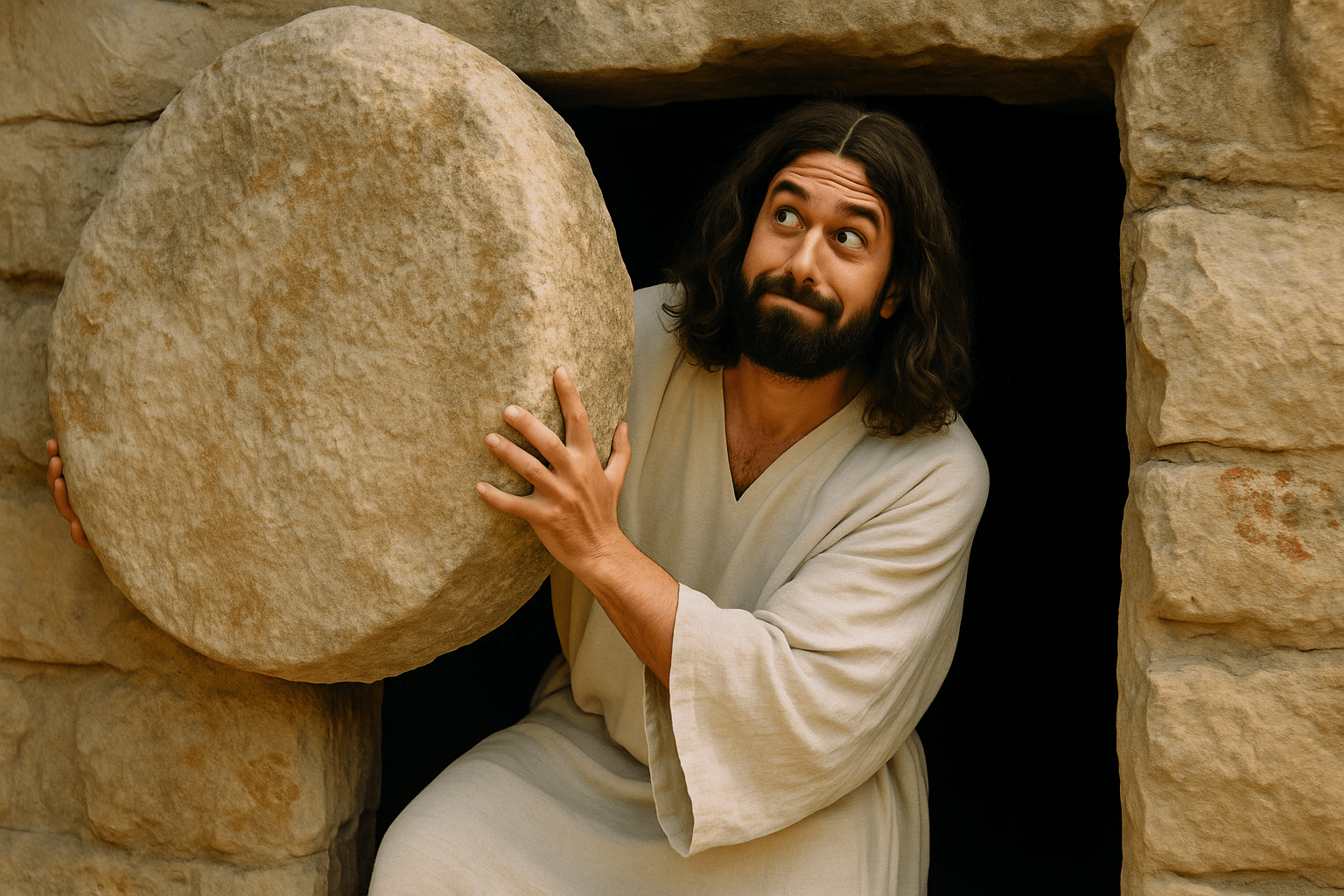Part 5 of Civic Theology: How the Bible Shaped America’s Founding and Freedom
When the Founders drafted the Declaration of Independence, they were not merely summarizing Enlightenment abstractions but invoking centuries of biblical truth. In that hot Philadelphia summer of 1776, Jefferson and his colleagues set quill to parchment under the lamp of the Creator’s law. We can almost imagine Jefferson’s desk: the Bible open to Exodus on one side and Locke’s Second Treatise on the other. The result was a declaration that “all men are created equal” – a radical idea for 1776 – yet one rooted deeply in Scripture. As historian Pauline Maier notes, the equality clause was “the most radical idea” of the Revolution . But far from a daring secular innovation, the concept has clear biblical ancestry: God created humanity in His image, He made every nation from one ancestor, and in Christ there is neither Jew nor Greek. In short, America’s founding creed reflects a “distinctly scriptural worldview”.
All Are Created Equal: A Biblical Heritage
The Declaration’s proclamation that “all men are created equal” was startling at the time – a notion even Emerson called a “blazing ubiquity.” Yet this equality did not spring from nowhere. From Genesis onward the Bible affirms universal human dignity. At creation, God made “male and female” in His image (Gen. 1:27), bestowing equal worth on every person. Psalm 8 echoes this dignity: God “made [man] a little lower than the angels… and crowned him with glory and honor.” The Apostle Paul would later say, “there is neither Jew nor Greek, slave nor free, male nor female… for you are all one in Christ Jesus” (Gal. 3:28). And Peter, preaching in Acts 17, declared that God “made from one man every nation of mankind” (Acts 17:26), underscoring our shared blood and brotherhood. The Declaration’s lofty phrases find these biblical echoes:
- Genesis 1:27 – All people are made in God’s image, bearing equal dignity.
- Acts 17:26 – God made “of one blood all nations of men,” affirming humanity’s unity.
- Galatians 3:28 – In Christ there is “neither slave nor free… for you are all one,” a spiritual equality transcending divisions.
These verses imply “all men” truly means all. No human is “born unequal”; every person carries God’s image. When Jefferson penned “endowed by their Creator,” he echoed the covenant God who claimed Israel at Sinai. The right to life, liberty and happiness comes not from Parliament or kings, but from the Creator, the very God of Abraham, Isaac, and Jacob. In God’s sight, even a newborn slave in Africa and the humblest colonist in Virginia stand on the same ground. This is no accident of politics but a theological truth. As Eric Metaxas observes, the Declaration’s famous lines were “based on a distinctly scriptural worldview” . The God who freed Israel from Pharaoh is the same One from whom Americans claim their rights.
Rights from a Creator – The Moral Lawgiver
The Declaration explicitly roots human rights in divine creation. It says Americans are “endowed… by their Creator with certain unalienable rights.” This clashes with the idea of rights springing from an impersonal “society” or blind Nature. Instead, the Founders echoed the Bible’s teaching that God is the ultimate lawgiver. Romans 1:20 teaches that “what may be known of God is plain… because God has shown it to them” through creation – God’s moral nature is “clearly seen” in the world around us. Likewise Psalm 19:1–4 proclaims, “The heavens declare the glory of God… there is no speech, nor are there words, whose voice is not heard.” In other words, nature itself is God’s pulpit. When the Declaration invokes “the Laws of Nature and of Nature’s God” , it assumes those laws come from a divine Lawgiver (echoing Romans 1) rather than from vacuum.
This Enlightenment-biblical hybrid phrase bridges reason and revelation. John Locke had written of a “Law of Nature”inscribed by God in the hearts of men, and Jefferson simply updated that language. The “laws of nature” are not impersonal forces but God’s intentional order. Their authority rests on “Nature’s God,” the God who made and sustains nature. Thus the Declaration aligns with Romans 1:20 and Psalm 19: the creation reveals God’s character and law. In effect, Jefferson was writing that the Creator’s design guarantees liberty: every human, as God’s creature, carries rights God grants. The rights of life and liberty come from God’s nature, not from human whim. So too the Founders believed in a moral absolutes – the “Creator” is the same God who carved the Ten Commandments at Sinai and wrote the moral code on human hearts.
Government by Consent – Echoes of Covenant
The Declaration also declares that “Governments are instituted among Men, deriving their just powers from the consent of the governed.” This ideal of consensual government has surprising biblical precedents. Israel’s own early history reflects voluntary covenants and chosen leadership:
- Exodus 24 – The Israelites affirm “All that the Lord has spoken we will do” (v. 3) and enter a covenant with God by their free choice. They deliberately pledge obedience to God’s laws, demonstrating consent to His rule.
- Judges 9:1–6 – In a darker tale, the men of Shechem and Israel voluntarily choose Abimelech as their king by vote (v. 15). Though it ended poorly, this episode shows the idea of electing a leader by the people’s voice.
- 1 Samuel 8 – Even God concedes that Israel may choose a human king. The elders say, “Make us a king to judge us like all the nations.” Samuel warns them, but God instructs Samuel to honor the request: the people’s choice overrides the prophets.
These examples reveal a biblical pattern: authority can be entrusted by the people rather than imposed by force. In covenant history, God usually set rulers Himself, but He also allowed Israel to ask for a king (and later overthrew kings who broke the covenant). Likewise, government by consent is hardly a strictly modern idea. It resonates with the Bible’s sacramental politics: God reigns over Israel because Israel freely reaffirmed His rule, and even the appointment of judges (Ex. 18:21) and elders (Num. 11:16) shows God validating leaders chosen for godliness. The Declaration’s insistence that power comes from the governed is thus in keeping with God’s own method of righteous rule – the people freely choosing life under God’s kingly authority.
Revolution as Righteous – Obeying God Rather than Men
Finally, the Declaration asserts the right of revolution: “whenever any Form of Government becomes destructive… it is their Right…to abolish it”. Many Europeans regarded this as dangerously radical. But Scripture provides a theology for resisting tyranny. Peter and the apostles boldly proclaimed, “We must obey God rather than men” (Acts 5:29) when civil law commands sin. Even in the Old Testament, prophets confronted unjust kings on God’s behalf: Nathan rebuked David for murder (2 Samuel 12), Isaiah denounced Judah’s wicked leaders (Isaiah 1–2), and Elijah stood against Ahab’s cult. These confrontations illustrate that God’s authority can override a ruler’s. Though the Bible normally teaches submission to authority (Rom. 13:1), it also makes clear that rulers are not to be obeyed when they defy God’s moral order.
Thus in cases of persistent tyranny, Scripture did not forbid resistance. The early church’s refusal to worship Caesar (Daniel 3, 6) or to abandon faith (Acts 4–5) implies a right to defy unlawful demands. Acts 5:29 became a rallying cry: obeying conscience and covenant over corrupt command. The Declaration stands on this biblical ground. When King George’s government violated the laws of nature and of nature’s God, the colonists asserted a higher allegiance – the Creator’s justice – just as Peter and the prophets had done before. In short, revolution (as a last resort) is consistent with the Biblical witness that the wicked suffer removal (Isaiah 10:12; Amos 5:24) when God’s people restore justice.
A Scriptural Narrative with Historical Roots
To see these threads woven together, consider an imagined scene: Thomas Jefferson writing the Declaration by candlelight, flanked by scripture. On his left hand lies Exodus, where Moses stood as leader by God’s command; on his right, Locke’s Second Treatise. Perhaps Jefferson even jots a note in the margin: “Creator = YHVH of Sinai.” When he writes “Laws of Nature and of Nature’s God” , he isn’t invoking Deism alone but invoking the Psalmist’s hymn and Paul’s sermon in Athens – blending natural revelation with biblical truth. One might picture Jefferson briefly debating Locke: “John, life and liberty come not from parliament but from God’s good order!” Locke might quip, “Indeed, Thomas – but I must commend you for substituting ‘pursuit of happiness’ for my ‘property’… a wise divine upgrade!”
Historically, Jefferson’s phrasing was deliberate. His original draft even praised “sacred and undeniable” rights and listed abuses by George III, but Congress softened it to “self-evident” and cut the slavery clause. Still, Jefferson’s nod to God and Nature carried Locke’s stamp: Locke too believed governments rest on the consent of the people. The Declaration’s final sentence – “consent of the governed” – reads like Locke’s law of free communities. But Jefferson elevated Locke’s ideas by laying them on biblical truth. As William Federer and others have shown, Jefferson’s “Creator” is not a vague force but the God of Exodus and Bethlehem. Metaxas rightly observes that Chuck Colson called these lines our “national creed,” and a creed steeped in Scripture .
The language of the Declaration even resonates with the poetry of the pulpit. It would not surprise a preacher from Jefferson’s day to hear “created equal” alongside a sermon on Psalm 8, or to see “pursuit of Happiness” echoing Jesus’ blessings of the poor. In that sense, America’s birth is accompanied by a biblical anthem: the same Creator who wrote the Ten Commandments across the sky (Ps. 19) is the author of our rights. By reading the Declaration and the Bible side by side, one discovers not an Enlightenment battleground but a symphony of timeless truth. It’s as if Jefferson penned, “We hold these truths… to be affirmed by the God of Israel,” giving the God of Abraham, Isaac, and Jacob a seat at Independence Hall.
America’s founding document stands on a foundation of inspired dignity and divine law. The cry “all men are created equal” resounds with Genesis; the claim of rights echoes Sinai; and the principle of just government by consent reflects the covenantal voice of Scripture. The laws of Nature’s God (Rom. 1:20; Ps. 19) and the statutes of the Bible converge in our Declaration. In short, the Declaration of Independence is not a secular artifact but a sacramental national covenant, proclaiming that liberty and justice have their source in the Almighty. As Chuck Colson said, it is our sacred creed , reminding us that the dignity and freedoms Americans cherish are ultimately gifts from the Creator, and that our covenant of liberty endures under His higher laws.
References
Federer, W. J. (2000). America’s God and Country Encyclopedia of Quotations. Amerisearch, Inc.
Locke, J. (1988). Two Treatises of Government (P. Laslett, Ed.). Cambridge University Press. (Original work published 1690)
Maier, P. (1997). American Scripture: Making the Declaration of Independence. Alfred A. Knopf.
Metaxas, E. (2016, April 22). Bible bans target world’s scariest book. USA Today.
The Holy Bible, New International Version. (2011). Zondervan.
United States, Continental Congress. (1776). The Declaration of Independence of the United States of America. Government Printing Office.
Want to explore further?
Dig Deeper into Civic Theology








